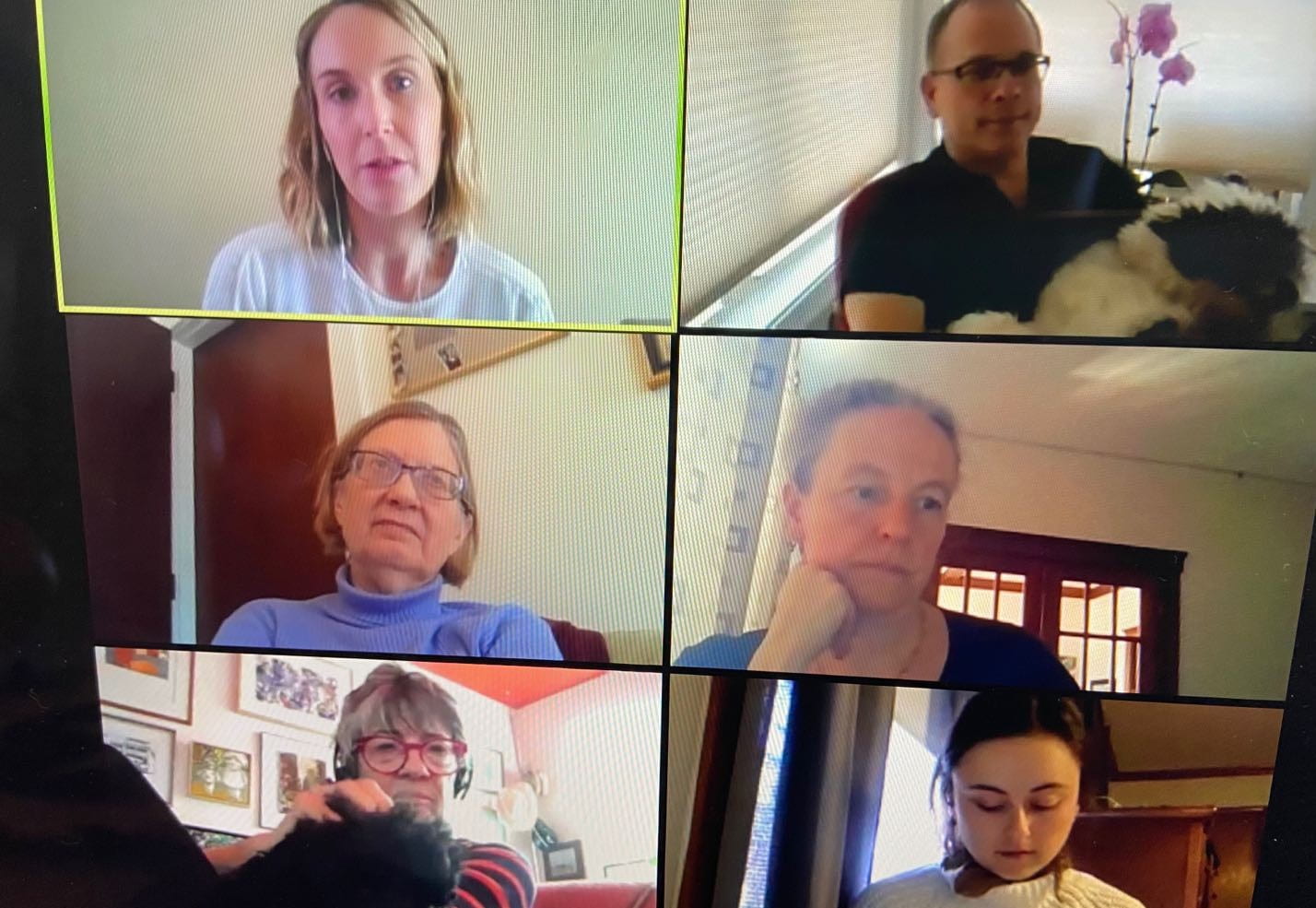
The new dissertation defense (pets welcome): Clockwise from top left PhD candidate Hayley Gleason defending her dissertation, professor Edward Miller, associate professor Kathrin Boerner, PhD student Molly Wylie, LeadingAge LTSS Center @Mass Boston co-director Robyn Stone and Brandeis University professor Christine Bishop.
Years of work, study and preparation came down to this final step: Defending PhD dissertations to a series of faces on a computer screen.
Conversing with images of people, arranged like tiles on an electronic board, had become a suddenly familiar experience for millions of people as Zoom and other virtual meeting platforms replaced live gatherings amid the growing coronavirus threat. No doubt many PhD dissertation defenses took place that way as campuses shut down across the country in March.
But the UMass Boston Gerontology Department’s busy schedule put that virtual work-around to a serious test: Five remote dissertation defenses in a span of four days. Three of them took place through the morning and early afternoon of a single day.
PhD candidates Andrea Daddato, Danielle Waldron and Hayley Gleason all defended their dissertations on March 31. Yijung Kim followed on April 2 and Haowei Wang defended the following day. All were successful.
“This was really a remarkable feat for the Gerontology PhD program,” said department Chair Jeffrey Burr. “We had never tried anything like it. The dedication and coordination among doctoral students, faculty and staff made it possible.”
Preparation for virtual defenses required new considerations. What specific location would be best to use during a dissertation defense? What about child-care adjustments? Who’s going to make sure the dog doesn’t barge in? Most importantly: Where was the strongest, most reliable wifi connection located?
Kim went to the kitchen in her home. Gleason chose her dining room. Daddato decided her home office was best. Waldron considered a friend’s vacant apartment for the quiet but worried about wifi reliability so opted for her childhood home instead.
“The sentiment of finishing my academic career in the same place where my love for learning began is a something I’ll always cherish,” said Waldron.
Daddato, Waldron and Gleason conducted a practice Zoom meeting four days in advance of their “Defense Tuesday,” when they all would experience the real thing. It was a chance to try out the platform and get helpful feedback from each other.
Wang went to Zoom to experiment with different audio options and camera angles ahead of her event. Kim tested different equipment and – realizing there would be no opportunity to pop champagne corks after the real event – got a can of sparkling wine to enjoy at the end of her defense.
All the candidates said they appreciated the support of their dissertation committee members. But they also thanked staff members who became particularly important in making sure the virtual defenses went off without any glitches – Michele Campbell, Diem Pham, Martin Hansen-Verma and Chris Brindley.
When their days finally arrived, the five said they felt no more nervous than they would have expected to be in a conventional, live dissertation defense. It became a very similar experience, but not entirely the same.
“In some ways I was less anxious because I could not see other people,” said Kim. “But I also lacked all the social cues of a presentation — how my voice sounds, whether I am pacing myself right, if everyone else looks bored.”
Wang was comfortable through her presentation, when she could speak uninterrupted. “But I felt nervous in the Q&A session because I could not have direct eye contact with the one who raised a question,” she said.
Remote dissertation defenses meant there was no opportunity for friends or family to attend the big events on campus. But the online format also made it possible for more people who would have been unable to attend live to watch and experience the virtual event.
“This was an aspect of the virtual defense that ended up being a real positive,” said Gleason. “My parents and two of my aunts were able to listen in to my defense, which they would not have been able to do if it had been in-person. They really enjoyed being a part of it.”
Wang said she was surprised by the number of people on his Zoom connection, though some had to jump on and off. One friend got up early in California to catch her defense.
Said Daddato: “It was so nice to see friends who I hadn’t seen in a while on the call.” Professor Edward Miller, a co-chair of her dissertation committee, said he felt there were more people in attendance during her remote event than are usually present for in-person defenses.
Now Daddato also has a recording of her dissertation defense that she plans to share with other friends and family members who were unable to join the live Zoom event.
The PhD candidates said they were grateful there was a virtual option available in an emergency to complete their dissertation defenses, though most hoped for a return to conventional live events eventually. They said a hybrid of a live defense captured by Zoom, allowing more people to watch, was perhaps the best option for the future.
But they all made it through the final step of the program, with a story to tell for the rest of their lives.
“It was a unique experience that I will brag about in the future,” said Wang.


Leave a Reply